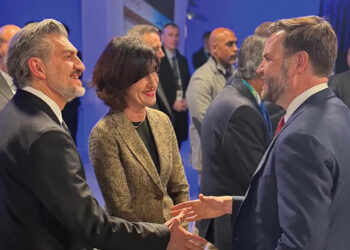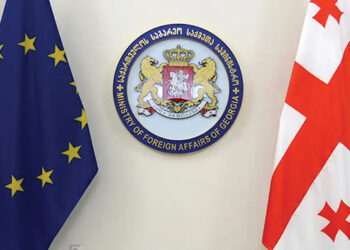Solomiia Bobrovska, a Ukrainian politician and civic activist who has served as a member of the Parliament of Ukraine since 2019, and was Acting Governor of Odesa Oblast from 2016 to 2017, sat down with Radio Free Europe’s Georgian Service to discuss Georgia’s third and very captive president, Mikheil Saakashvili, and her president’s latest demand for his release.
“Mikheil Saakashvili is a Ukrainian citizen,” she begins by stating. “And you’ve likely seen our President Zelensky’s statement? That’s the first time in our common history, when an ambassador was sent back to figure out the next steps. And can Georgia explain the conditions of bringing Saakashvili back to Ukraine as he is a Ukrainian citizen? Because we saw the conditions they have him in, they are abnormal. For me, as a person who has known him for years, it’s very painful to see him this way, and I think President Zelensky had the same reaction. We all support the reaction of President Zelensky, and his decision to demand and bring Saakashvili in any possible way back to Ukraine, so we can give him the proper, needed medical support, just to save his life.”
Zelensky’s statement actually upset quite a few people in Georgia, mostly in the pro-government circles. He was accused of interfering in the domestic affairs of Georgia. What would be your answer to that?
It’s painful to see what is happening to the Georgian government, not only because of Misha, but also because of the war. Georgia’s was one of the few parliaments in the world who refused to allow President Zelensky to make a speech. Then we see regular flights to/from Russia, we see the arguments about Ukraine and NATO. So, it’s no surprise what they say about Saakashvili. But he, once again, is a Ukrainian citizen, with a Ukrainian passport. And we will insist that he is returned to us, so that we can save his life.
You’ve seen the condition he is in, it’s frightening. He is being treated worse than Russians treat prisoners of war, and that should tell you something. And so, I’m not sure that we care about some Georgian politicians being upset. What we see is that Georgia is moving in the same direction Yanukovich was leading us back in 2013, when he was trying his best to firmly place Ukraine under Russia’s umbrella. The Georgian government has sadly chosen the same way. We see the big gap between the government and the people – we see the Georgian volunteers fighting here, on the frontlines, we see Georgians supporting us and we appreciate it a lot. But we cannot accept what their government is doing – I fear that after 15 years, Georgia started to forget what Russia did to it back in 2008 and in 1991-94.
When you say you will continue to insist that Saakashvili is given back to Ukraine – what leverage does Kyiv actually have to persuade the Georgian Dream to hand Saakashvili over?
You know, I was surprised when Zelensky made that statement, I didn’t suspect he’d opt for such a radical approach. In diplomatic language, when you send back an ambassador for consultations, it means a lot and it’s never happened between Ukraine and Georgia before. That means Kyiv things there is no point holding back anymore, that the line has been passed. And I think the President and his office will continue to find ways to bring him back, despite all the other things that are happening here, the war and so on.
In that statement, he also said that “Russia is killing a Ukrainian citizen at the hands of the Georgian authorities.” This echoes earlier remarks by Saakashvili when he said he was being slowly killed on Putin’s orders. What’s your take on that?
It’s very obvious that Misha has become a big threat for Russia. He brought a totally pro-Western policy to Georgia and Ukraine, to this day, isn’t at the reforms standard that he brought to Georgia. He is a symbol that is a complete opposite of what Russia is trying to impose on Georgia. He is part of the system that has to be destroyed. We all know Misha – he is complicated, difficult, unpredictable, and so on. But he is a phenomenon in the post-Soviet world, and it’s not strange at all that Russia would seek to have him destroyed, when it finally got a chance to do so. To me, it’s very obvious.
As a member of the NATO parliamentary assembly from Ukraine, and with the Vilnius Summit at the door – what impact do you think this incident will have on Georgia’s NATO aspirations? How effective a calling card is this to knock on Brussels door?
I think it will take years and years to become what Georgia was 10-15 years ago, when it really was way ahead of Ukraine on its path to join the EU and NATO. Now Georgia’s government claims they’ve fulfilled all the criteria. It’s very artificial. Sadly, I don’t believe it is going to be a fast-track process for Georgia, and don’t believe that it’s going to happen while that Russian oligarch is controlling the entire state. The EU and NATO can see very clearly what is happening to Georgia.
Suppose, unlikely as it is, the Georgian government acquiesces to Kyiv’s request and he’s returned to Ukraine. What future would he have there? Can he still help Ukraine?
First of all, he has to pay attention to his medical rehabilitation and his health, that goes without saying. I think he has a future in Ukraine, and that he can help Ukraine, because he really knows the style of Russian warfare, the Russian logic, and we are in one basket. As a Georgian, he knows very well how Russians behave on the world stage, in international politics. He is also well aware how to talk to the key players in the world, to Germany, France, Netherlands, Italy and, finally, how to make Ukraine the 33rd member of NATO.
Interview by Vazha Tavberidze














